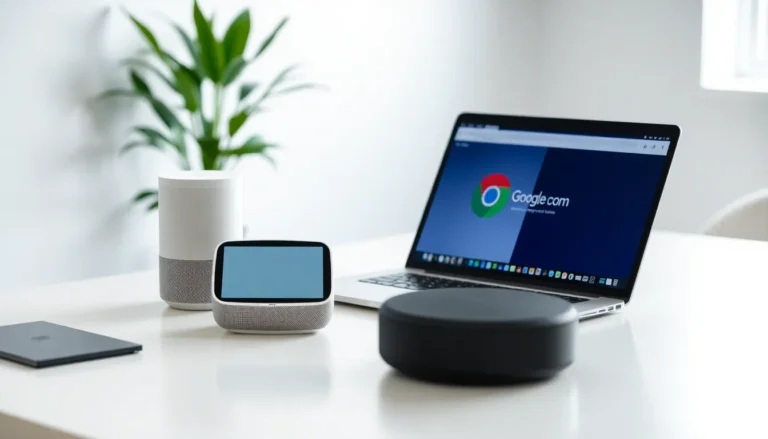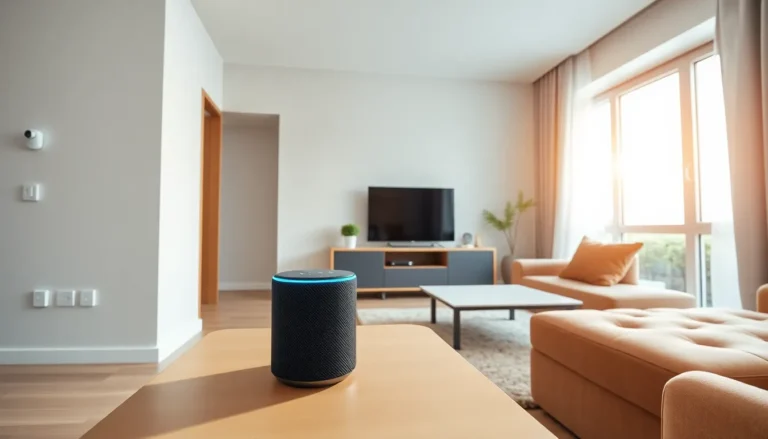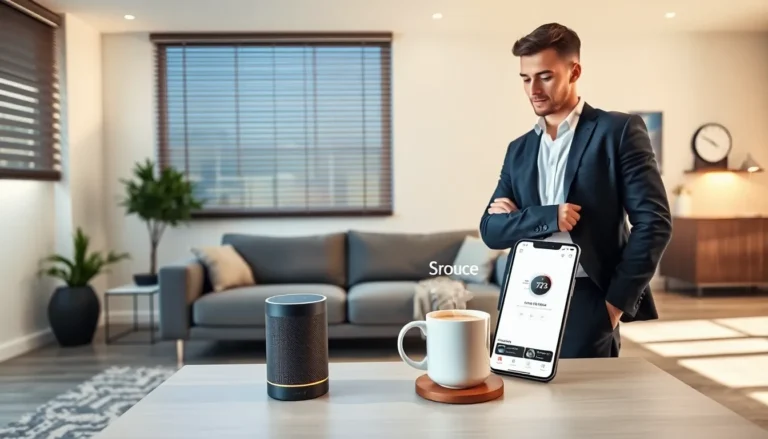Table of Contents
ToggleImagine a world where your home anticipates your every need. With home automation systems, this isn’t just a sci-fi dream; it’s a reality. From lights that dim with a voice command to thermostats that know when you’re chilly, these smart systems transform everyday living into a seamless experience.
Gone are the days of fumbling for switches or adjusting the thermostat like it’s a Rubik’s Cube. Instead, homeowners can enjoy the convenience of controlling their environment at the touch of a button or through a simple voice command. It’s like having a personal assistant who never takes a coffee break!
As technology advances, the benefits of home automation keep stacking up. Not only does it make life easier, but it can also save energy and enhance security. So why not step into the future and let your home do the heavy lifting?
Overview Of Home Automation Systems
Home automation systems integrate various technologies to control home devices through a centralized platform. Such systems enhance convenience by allowing users to automate tasks like lighting, heating, and security. Smart lighting can be scheduled to turn on or off at specific times, improving energy efficiency.
Thermostats equipped with learning algorithms adjust heating and cooling based on user behavior, leading to noticeable reductions in energy costs. They also provide remote access, enabling homeowners to change settings via smartphone apps, ensuring comfort regardless of location.
Security features play a critical role in these systems. Smart cameras and motion detectors monitor the property, sending alerts when unusual activity occurs. Homeowners can view live feeds and recorded footage from their devices, adding an extra layer of reassurance.
Voice control enhances the user experience significantly. Systems compatible with virtual assistants allow users to manage their home environment using simple voice commands. This hands-free interaction makes it easy for everyone, including those with mobility issues, to control their living spaces.
Compatibility with various devices is another key aspect. Many systems work seamlessly with third-party gadgets, expanding the range of automation possibilities. Appliances like refrigerators, locks, and sensors can communicate with each other, creating a cohesive smart home ecosystem.
Ultimately, home automation systems offer diverse benefits that contribute to lifestyle improvements. Users enjoy greater control, efficiency, and security, making these systems an attractive option for modern living. Embracing this technology provides a pathway to a more convenient and efficient home environment.
Benefits Of Home Automation
Home automation systems offer several advantages that enhance day-to-day living. They provide users with increased convenience, energy savings, and improved security, making smart homes more appealing.
Convenience And Comfort
Convenience comes at the forefront of home automation. Users can control multiple devices with a single command, minimizing the need for manual adjustments. Smart systems allow for scheduling of lights, heating, and appliances based on individual routines. Voice commands add another layer of comfort, enabling hands-free management. Additionally, remote access via smartphone apps ensures users can adjust their home environment from anywhere. This integration of technology simplifies daily tasks while creating a more personalized living space.
Energy Efficiency
Energy efficiency stands as a crucial benefit of home automation. Smart thermostats can learn user habits and adjust heating or cooling based on occupancy. This functionality helps to lower energy bills, resulting in substantial savings over time. Automated lighting systems also contribute by turning off lights when no one is present in a room. Monitoring energy consumption provides insights, allowing users to make informed decisions about usage patterns. By optimizing energy management, these systems significantly reduce waste and enhance sustainability.
Enhanced Security
Enhanced security is another vital aspect of home automation. Smart security features, such as cameras and motion detectors, provide real-time monitoring, adding an extra layer of protection. These devices send alerts to users when unusual activity is detected, ensuring prompt responses. Integration with smart locks allows for secure entry and monitoring of who accesses the home. A comprehensive security system ensures peace of mind, whether at home or away. Home automation empowers users to stay connected and secure, creating a safer living environment.
Types Of Home Automation Systems
Home automation systems encompass various technologies that enhance the convenience and efficiency of daily living. Understanding the different types can help users select the right components for their smart homes.
Smart Lighting Systems
Smart lighting systems provide customizable control over home lighting. Users can adjust brightness levels and colors through mobile apps or voice commands. Scheduling options enable lights to turn on or off at specific times, promoting energy efficiency. Motion sensors further enhance convenience by activating lights when someone enters a room. Integration with other smart devices creates seamless scenes, such as dimming lights for movie nights or brightening them for morning routines.
Smart Thermostats
Smart thermostats optimize heating and cooling in homes. These devices learn user preferences over time, adjusting temperatures based on occupancy patterns and preferences. Remote access via smartphone apps allows users to monitor and modify settings while away from home. Energy usage reports provide valuable insights, helping homeowners make informed decisions and reduce costs. Scheduling thermostats enhances efficiency, ensuring homes are comfortable when occupied and conserving energy when empty.
Security Systems
Security systems in home automation offer advanced features for monitoring and protection. Smart cameras provide real-time video feeds accessible from mobile devices. Alerts for unusual activity add an extra layer of security, notifying homeowners of potential threats. Integration with smart locks allows for remote access control and monitoring of entry points. Motion detectors enhance safety by triggering lights or sending alerts when movement is detected. Overall, these systems ensure peace of mind while enhancing home security.
Key Features To Consider
Home automation systems offer specific features that enhance user experience and functionality. It’s essential to evaluate these aspects before making a decision.
Compatibility With Devices
Consider compatibility with various devices when selecting a system. Ensure it integrates seamlessly with smart lights, thermostats, cameras, and locks. Manufacturers frequently support a wide range of brands, making it easier to connect existing devices. Interoperability between systems plays a crucial role in creating a cohesive ecosystem. Users can benefit greatly from systems that allow addition of new devices without major overhauls. Evaluate the compatibility list provided by manufacturers to confirm device support.
User Interface
The user interface significantly impacts the operation of home automation systems. A well-designed interface provides instant access to controls and dashboards. Users often prefer systems with mobile apps that are straightforward and easily navigable. Clarity in design reduces the learning curve associated with new technology. Additionally, voice control options enhance accessibility, ensuring users can manage their environments effortlessly. Opt for systems that offer intuitive interfaces, focusing on user experience as a priority.
Customization Options
Customization options provide flexibility to tailor home automation systems to individual needs. Users appreciate features that allow personalization of settings for lighting, temperature, and security. Scheduling capabilities help automate tasks based on daily routines. Some systems enable the creation of specific scenes, adjusting multiple devices with a single command. Furthermore, robust user profiles allow for adjustments according to preferences. Prioritizing customization ensures a home environment that aligns perfectly with personal lifestyles.
Home automation systems are revolutionizing the way people interact with their living spaces. By integrating technology into daily routines they offer unparalleled convenience and efficiency. With features like smart lighting and adaptive thermostats homeowners can enjoy a seamless experience that not only saves energy but also enhances security.
As more individuals embrace this technology the benefits become increasingly evident. From remote access to hands-free control these systems provide a level of comfort that aligns with modern lifestyles. Investing in a home automation system is not just about upgrading technology; it’s about creating a personalized environment that caters to individual needs while promoting a safer and more efficient home.







